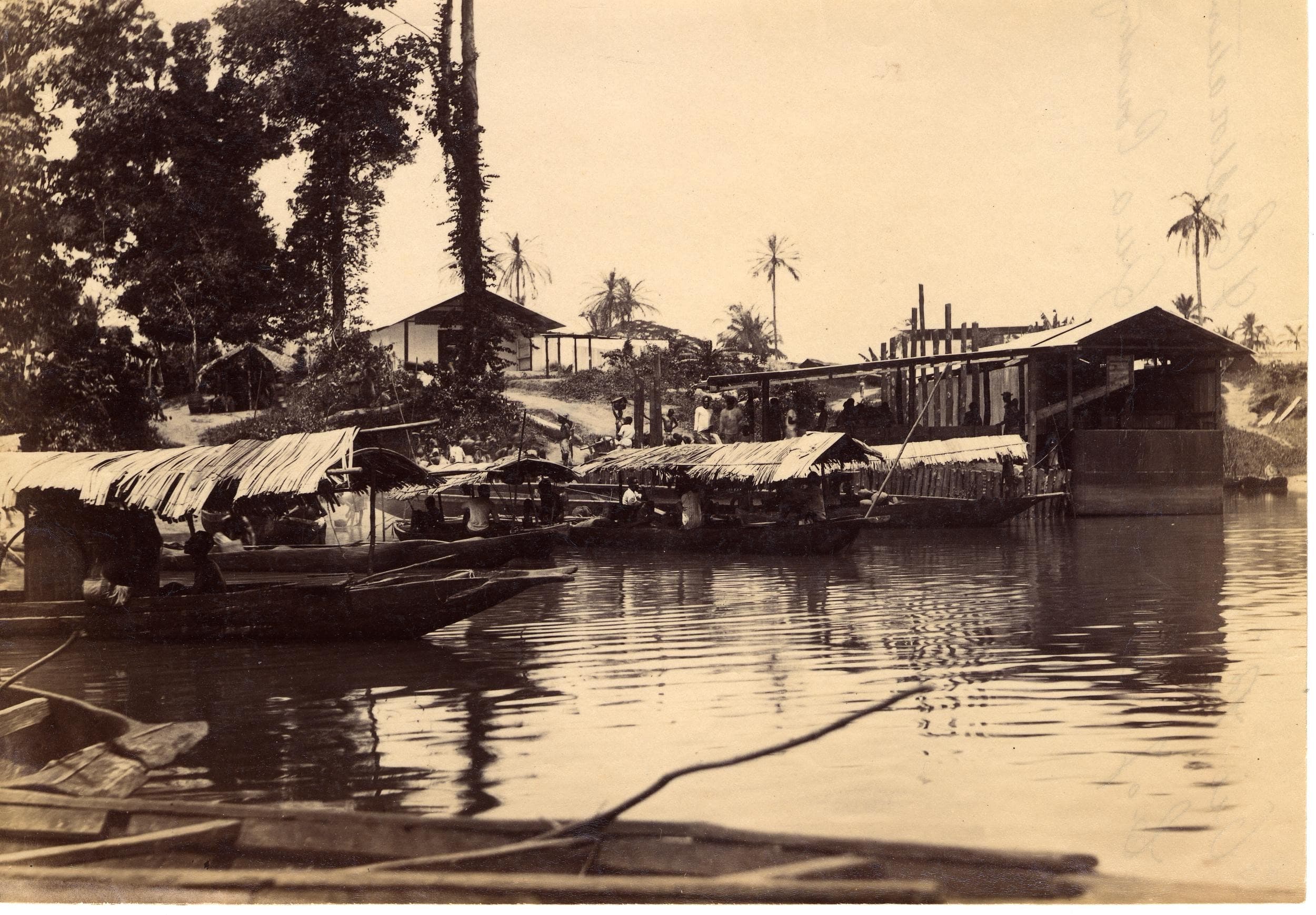King's College London
Nigeria: Practices of Colonial Power in the Niger Delta

Authored and curated by Naluwembe Binaisa
Time echoes through this preliminary visual enquiry into practices of colonial power in the Niger Delta. It seeks to trace the complex iterations of injury as well as the multi-sited cycles of agency. The people, land and environment on this rim of the West African coastline, whose interior is bisected by the mighty River Niger, have for centuries been imbricated in the violent dynamics of the Africa <> Europe compact. From slavery to palm oil, to petroleum and poverty, these people, their land and environment persist despite centuries of hope dressed up as civilizing missions, dispossession framed as material progress. At the center of these seemingly endless iterations of violence, hope, conflict and resource extraction, are the exigencies of . This forms the bedrock on which practices of colonial power rest to sustain multi-dimensional injury, which continues to bleed into postcolonial Nigeria. Fieldwork and ongoing research across the course of this project will seek to enrich this enquiry and incorporate private and alternative archives, documents, images, objects and testimonies, to further interrogate colonial practices and their afterlives. In this exhibition four interrelated themes trace these sedimented flows: Treaties and Maps; Symbolic Power; Circuits of Extraction and Production; Agency and Resistance.
Circuits of Extraction and Production

The dominance of Unilever as a global company is testimony to its nearly 100-year history. Unilever was established on 1 January 1930 when Lever Bros merged with Margarine Unie. United Africa Company (UAC) was formed when the Niger Company and the African and Eastern Trade Company merged on equal terms on 29 April 1929. UAC was to go on to be an independent subsidiary of Unilever its parent company. According to its publication Brief Guide: United Africa Company, the origins of the Niger Company are connected to the Royal Niger Company (RNC). RNC was granted a royal charter in 1886 giving it governance and commercial authority to act for the Crown. It ceased to exist in 1900 after the company lost its charter, becoming the Niger Company Ltd, a solely trading business. Lever Bros bought the Niger Company in 1920.

I use the term circuits of extraction and production to capture the integrated relationships between the primary resources of land, environment, resources and labour that connect global markets through transnational trade flows. The Niger Delta has been central to these extractive flows that linked Empire during the colonial period to Britain, Africa, Asia, the Americas and Europe. Palm oil and kernels were key resources for a range of commercial and manufacturing activities. This letter from the Niger Company dated 1924 from the Bodleian Libraries Special Collections, University of Oxford, is addressed to Sir Frederick Lugard, who was to become Lord Lugard, and who served as the first Governor-General of Nigeria. His ongoing interests in the palm oil industry in the Niger Delta underscore the entanglement of the political with commerce. A pattern that endures in the contemporary period of petroleum extraction.
The archives are replete with documentary evidence in the form of contracts, letters and survey maps that illustrate the continuities of ‘the triangular trade’, where Africa served as a resource basin as well as a source of new markets. This image is the back of the letterhead above from the Bodleian Libraries Special Collections and shows a partial map of Africa titled: The Sphere of Action of the Niger Company. The illustration to this heading renders invisible, the boundaries and borders of rival British, French and Belgian Empires who politically laid claim to different sectors of this continent. By 1924 as indicated in this letter the company was concerned about the difficulties of gaining a reliable source of palm fruits in the Niger Delta.


Vintage images illustrate the longevity of these intersecting circuits of extraction, production, distribution and global trade. This image from the British Museum archives by the renowned Niger Delta photographer Jonathan Adagogo Green, shows the palm oil grading process taking place in the Niger Delta where the palm oil and palm kernels were harvested, and barrels loaded for export (Anderson and Aronson 2017) . Through these images we can follow the palm oil and kernels that were harvested in the Niger Delta to ultimately re-enter global markets in Britain, Nigeria and further afield as global brand products. The wealth generated from the unfair and unequal terms of extraction and exploitation of commerce under Empire is a theme that is increasingly under scrutiny in debates around reparative justice. Current ongoing research and activism by scholars such as Prof. Stephen Small, calls for reparations to include the harm and injury of Empire as well as slavery. Click on this link to see Prof. Stephen Small make the case for more wide-ranging reparations with a specific focus on Liverpool and West Africa: writingonthewall.org.uk
Contrasting Media in the Colonial Space

Communications media rapidly accelerated in the colonial period complicating circuits of extraction. Magazines such as the West African Annual initially funded by the colonial government, provided an early vital conduit for advertising that promoted the status quo. This image from a Shell advert in 1957 highlights the multiplicity of markets where it positioned itself as providing a solution to consumer and commercial needs. The cartoons in this advert are in marked contrast to anticolonial political cartoons by the pioneer cartoonist and artist Akinola Lasekan. His cartoons appeared in the radical ground-breaking campaigning newspaper The West African Pilot owned by Nnamdi Azikiwe, and which was crucial to establishing his campaign for Nigerian nationalism (Olaniyan 2002).